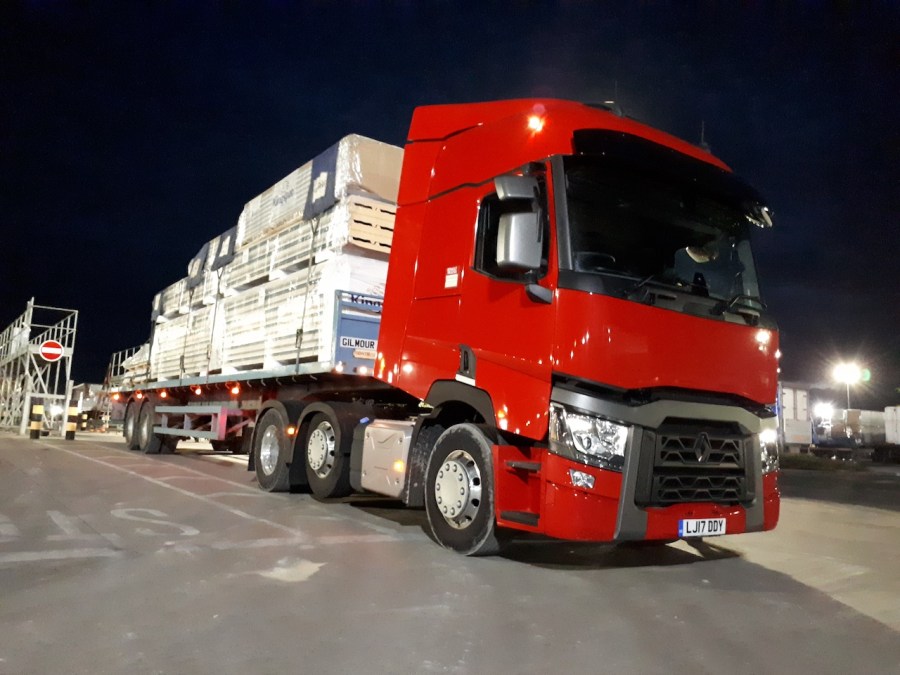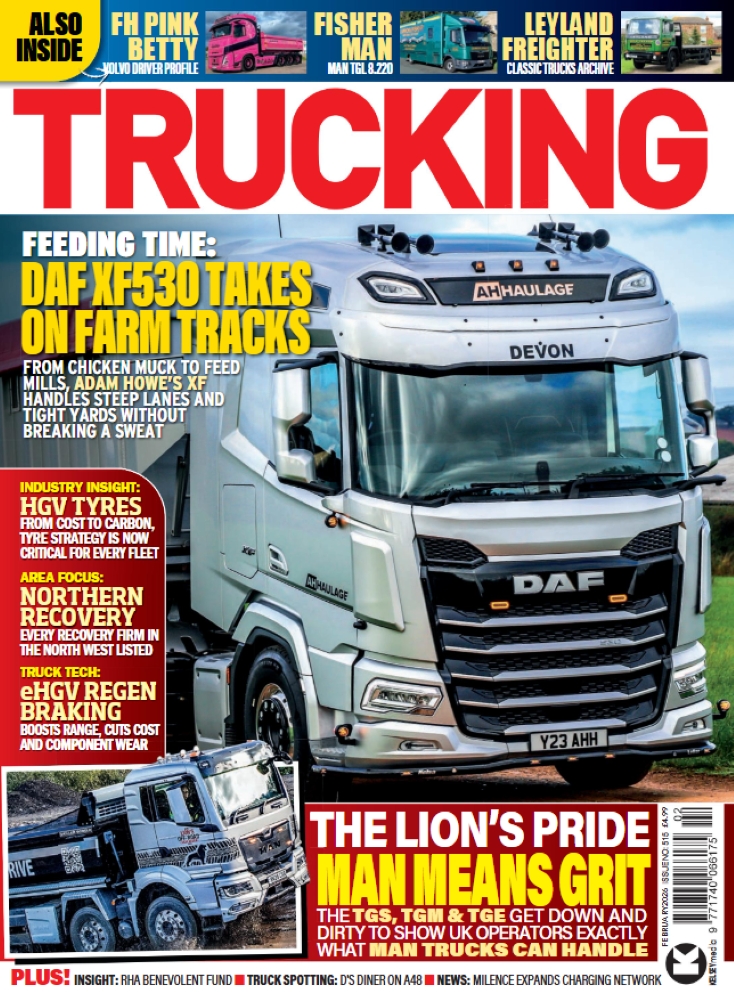We pity the fool that don’t appreciate the Renault Range T480’s blend of performance and driver appeal. “Fleet spec” doesn’t have to mean dull, suckers!
The Range T has been with us for almost five years. In that time, it has strengthened Renault’s reputation in the marketplace. The looks were pretty controversial at the time, but that was not helped at all by the decision to paint the launch trucks an appalling shade of green (brown?). There was a lot to like about the T’s predecessor the Premium, with the Optidriver auto ’box, powerful engines and fine handling winning quite a few people over. The downside was the cheap interior and an image well-entrenched in the less glamorous end of the market.
If there had been a Twitter competition to name the Premium, it would have been called ‘Fleety McFleetface’.
Those issues were sorted with the T – a larger 2.5 m wide cab offered much more space, and a higher quality interior, while still offering sharp steering and performance. We were delighted to be able to spend a week with one – a 480 bhp model with a couple of the Comfort option packs added. The standard Range T is quite basic, but this demo unit had options typical of what you’d find on a truck on long-distance operations such as the refrigerator, Bluetooth stereo and adaptive cruise control.
Be prepared
I had previously spent a day with a similar Range T back in 2016, where it outperformed the MAN TGX 480 by quite a margin. One thing I remembered was how complex the interfaces and button arrangements were on the T; there are even buttons – important ones at that – hidden on the rear of the steering wheel.
Keen to make sure I was prepared, I spent half an hour at Truckfest Scotland in the cab with Renault’s driver trainer Steve, who guided me through all the systems. Off the back of that, I had TEN pages of notes. Remember not so long ago at all, when “fleet” meant “simple”? Well, not any more. The Range T is bursting with clever technology. Whether many drivers have a clue as to how they use it, is another matter.
I’ll come back to the driver interfaces in a bit, but to begin with you’ll want to change the speedo display from kmh to mph. That should be done with the press of a button, right? Wrong. Using the roller wheel hiding on the rear of the wheel, go to ‘menu’, scroll to ‘settings’ and click, scroll to ‘units’ and click ‘imperial’. You may also want to enable Opti-roll at the same time. These settings are then saved by the lorry so it recognises your tacho card in future. It seems overly complicated, and explains why I overtake Ts which are displaying kmh (you can see the digital speedo through the window easily) – the drivers haven’t worked out how to change it!
Clean running
The T was to be deployed on my usual mix of work, mostly hauling flat-deck trailers throughout Scotland and England, moving wall cladding, bricks, concrete barriers and so on. My first job was to get it washed before we photographed it, and I reckon the T looks great in gleaming red. I’d personally paint the grille bars the same as the cab, but overall I think the design was probably a bit ahead of its time and is bedding in well now.
Packing my gear into the T was fairly easy. The optional upper bunk comes in handy, as it has a clever feature that folds the front lip upwards to the bunk so it can be used to store items tidily and securely. The fridge is a good size, but it’s wide, meaning when you pull it out, it takes up almost all of the floor space. It makes you wonder if they wouldn’t have been better raising the bunk and going for a squarer fridge with a storage box alongside it. The cab’s big enough to accommodate it.
Also, the floor above the engine tunnel is covered in a plastic that looks like it might be quite grippy, but it isn’t. I sat my holdall beside me with paperwork on top, and as soon as I turned right at the first roundabout the whole lot flew into the passenger footwell and I had to stop at the next motorway exit to retrieve it all. I also temporarily lost a footlong steak and cheese Subway in the same manner the following day (cue much swearing). You’re gonna have to get a carpet of some sort on the tunnel to prevent that.
Getting to know you
That aside, the T was very smooth and quiet on the motorway. On A-roads the Opti-driver software works seamlessly, responding well to light touches on the throttle. The driver’s seat offers plenty of adjustment, as does the steering column with its weird, flat steering wheel. A very relaxing drive. I only had to trunk a load of cladding up the road to begin with; you’d be hard pressed to know if there was even a load on. Maxing out a 10-hour card behind the wheel of a T is no hardship at all.
The following day saw more of the same, except this time I would be doing a night out after a trip down south. Again, the driving experience was spot-on; it’s hard to knock the T for driver appeal. The interior layout does come up short for the driver though; there’s a lot of little storage areas in the dash, ideal for coins, but there’s no big pull-out drawers or wide storage trays. And there’s only one cup holder and my thermal mug barely even fits in it. The new trucks I drove either side of the Range T were the Volvo FH and the Iveco Stralis and both have far better thought-out interiors.
Having said that, I reckon the Renault bunk is excellent and the cab is well insulated too. I had to spend a night in the Walton Summit Industrial Estate one night, which is always jam-packed with trucks. I was late in getting parked up and managed to get just about the last space available. No matter; the T’s superb sleeping arrangements meant I always got a good night’s sleep.
Going gets tough
I did encounter a particularly tricky delivery at a big building site in Burnley. I was fourth in a line of trucks to enter the site, one-in-one-out. We had to drive in forward then reverse round 90 degrees, reverse another 100 m or so, and then another 90 degrees. Not a problem, except the site was a muddy mess. One of the trucks got stuck, and there was a lot of messing about while a strap was hooked up and a JCB Loadall hauled it out.
I really didn’t fancy either getting out the truck, or finding out where the towing equipment was, so I hoped the Renault would do me proud with its state-of-the-art transmission and brand-new tyres. “Stay away from the left-hand side,” said one of the workmen. “Don’t worry, I will!” I replied. The ground was proper soft, but thanks to the responsive, smooth throttle control, I was able to keep the T moving at a consistent, slow speed through the mire, all the way round to where I needed to be.
It took a few minutes for the JCB to unload the trailer. Then I had to get out. With no weight now pressing on the drive axle, there was some initial wheelspin. I hit the air dump button, engaged the diff lock (which is an optional extra!) and the truck eased out of the mess with the minimum of fuss, and I even got a couple of compliments for successfully extracting it. Sweaty-armpits stuff, but the Renault passed the building site test. In fact, I had it on a rough building site in Edinburgh later that week and it was fine there too. It’s surprising that a diff-lock isn’t fitted as standard; I’d say that’s a must-have item on a tractor unit.
It wasn’t until the Thursday that I finally got a decent payload to haul. A full load of bricks from Carlisle up to Scotland would see how the 13-litre engine measured up. It may say 480 bhp on the door, but the key figure is the 2400 Nm of torque available from 950 rpm. I’m really getting to like some of these Euro 6 “Step 2” engines, they’ve got a lot more grunt than previous Euro 5 and 6 stuff. The Renault tackled the 44-tonne gross weight very well, needing only a pre-emptive downshift at the two hills on the M74 at the Dumfries and Galloway border.
Power mode, where you kick down gears by flooring the accelerator, was locked out on this model, but you’re free to change gear as you choose so it didn’t really matter. The Optidriver shifting set-up seems to know from your throttle inputs and the strain on the engine when it can afford to lug down, when it should hold onto a gear and when it needs to change down. The engine brake is powerful too, although it is activated by the same flimsy, unsatisfying little lever that was in the Premium.
Tech loadout
The Range T is packed full of clever features, although its driver interface systems are, in my opinion, too complicated and not accessible enough. I could write an entire article on what all the things do in the computer system. For example, sixth bar down on the vertical computer menu are the “soft-cruise” options, which alter the gearing, meaning you can fine-tune the adaptive cruise for when you’re heavily freighted or in hilly terrain. There’s so much to it, but the plethora of menus, buttons and levers make it feel like it’s being complicated for the sake of being complicated.
In addition to that, the dashboard and driving environment isn’t particularly well designed. The USB and Aux In sockets are located above the windscreen, but there isn’t a suitable place to put your handheld device safely out the way!
It’s little things like that, and the slidy plastic floor and lack of a decent cupholder or place to store documents that started to get to me after a week, because I was used to driving trucks that offer those things – older trucks with nowhere near the refinement and road manners of the T.
VERDICT
The Range T offers a first-class driving experience; power, gears, steering, handling, braking. All bang on, as is the comfy bunk. The size of the cab is “just right” for a few days away; I’m not a fan of over-sized super cabs for going onto building sites with anyway. So it does frustrate that the interior seems to have been designed without as much thought as it could have been. It’s 80 per cent excellent – it does all the hard bits so well, and falls short on what should be the easy stuff.
More information: http://www.renault-trucks.co.uk






